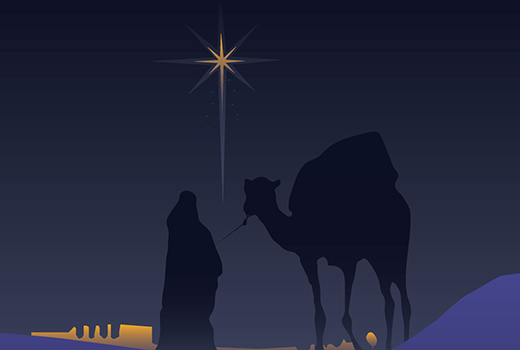One word can often be crammed with meaning.
For instance, the mere mention of “Christmas” can evoke images of sparkling lights, smiling children, joyful carols and jovial Santas. Biblical words are no different. Terms like covenant, law, and even the word “word” itself, overflow with scriptural significance.

Bryan Cribb
In the well-known story of the Magi’s visit to Jesus in Matthew 2, we find one of the most important and loaded scriptural words: “Messiah” (verse 4). Modern-day Christians often gloss over this term as just another name for Jesus, without fully appreciating its depth and import.
But to Matthew’s audience of Jewish Christians, that title brought to mind hopes, images and promises, steeped in Old Testament tradition. The word also induced strong responses among the people in Matthew’s account, Herod and the Magi.
Appreciating the Old Testament background of Jesus’ Messiahship can help us to grasp the significance of our Lord more fully and can inspire us to do what the Magi did: bow before the Savior.
The Messiah as the Davidic King and Lord
Some initial clues to the Old Testament understanding of the Messiah are found in the text of Matthew 2 itself.
First, Matthew indicates that the Messiah will “rule” (verse 6) as King. As the Magi state, the Messiah will be “King of the Jews” (verse 2). Indeed, the Hebrew term “Messiah” (meaning “anointed one”) is clearly a royal title.
But the Messianic ruler Matthew references is not just any king. The Messiah in the Old Testament is inseparable from King David (Psalm 2:2, 89:20, 132:17), and Matthew makes this connection very clear. In quoting Micah 5:2, Matthew indicates that the Messiah would hail from David’s hometown, Bethlehem. So, too, in using the verb “shepherd,” Matthew makes another allusion to David.
Why is it significant that Jesus is a king from the line of David? Like David (Deuteronomy 17:15), Jesus would be the “King whom Yahweh has chosen.” Like David (1 Kings 11:33-38, 14:8), Jesus would keep Yahweh’s Torah and commandments and possess exceptional spiritual quality. Like David (2 Samuel 7:14-15), Jesus would have a father-son relationship with God and be the object of God’s lovingkindness.
But though David served as the example against whom all subsequent Israelite kings were measured (1 Kings 15:3; 2 Kings 18:3), he was still flawed — and dead. Thus, later biblical writers would make reference to and anticipate another “anointed one” in David’s line who would surpass David in every way.
By citing Micah 5:2, Matthew unmistakably demonstrates the Messiah’s superiority to His predecessor. Though He, like David, would be born in Bethlehem, the Messiah’s “goings forth are from long ago, from the days of eternity.” And the Messianic kingdom would be “great to the ends of the earth” (Micah 5:4) — unlike David’s provincial realm.
Other verses in the Old Testament also prophesy of the Messiah’s incomparability. This new Messianic King would rule on the “throne of David” eternally in fulfillment of the Davidic covenant (2 Samuel 7) and would even be called Mighty God (Isaiah 9:6-7). His reign would be universal (Isaiah 49:6), and, ultimately, all the nations will resort to this Root of Jesse (Isaiah 11:10). Perhaps this is the reason Matthew included the account of the Magi in the first place. Matthew shows that the Messiah will receive worship not just from Jews, but from all peoples.
This Messianic King would also outshine His ancestor, David, spiritually. God’s Spirit would rest on Him (Isaiah 11:2; 42:1), and righteousness and faithfulness would be as His belt (Isaiah 11:5). In fact, the very name of this “righteous Branch” of David would be “The Lord our righteousness” (Jeremiah 23:5-6).
And all this is packed into one word: Messiah. Is this how we think of the Messiah, Jesus Christ? It is easy, especially during Christmas time, to allow the world to define who Jesus was and is. We should strive to make our conceptions of the Messiah scripturally based.
The Messiah as worthy of worship
But how should we react to such a Messiah? As we noted above, the term “Christmas” for many induces warm imagery and emotions. However, some do not react to the term as positively. The same is true with the word “Messiah.” In Matthew 2, the news that the “Messiah” had come inspired contrasting responses from Herod and the Magi.
Having governed Judea for almost 40 years, Herod felt threatened by the Messiah. Herod acted as “king” (verse 1), and he took drastic measures to preserve his dominion, often killing those who opposed him. The Messiah’s advent did not please him at all, and because of his fear and suspicion, “all Jerusalem was troubled with him” (verse 3). Though he espoused a desire to worship the Messiah, in actuality he hated Him.
Similar reactions are seen today. An orthodox, scriptural presentation of Jesus Christ as Messiah, Lord, and only Savior often evokes hatred of the message, the messenger and especially God Himself. The gospel is an offense. As Christians, we should expect opposition to our message. But like the apostles and Jesus Himself, such antagonism should not discourage us from sharing the Good News, nor should it deter our worship of Christ during this season.
Herod’s rage did not daunt the Magi from the east, who model for us the second type of reaction to the Messiah: worship. Foreigners and strangers to the covenant, the Magi traveled great distances, followed an evasive star, and sacrificed much — all for the opportunity of seeing and worshiping a promised King.
At Christmas, many Christians are dissuaded from worship of this same Messiah by busy schedules, perceived inconveniences and family obligations.
This Christmas, let us commit to be like the Magi. Despite “Herodian” opposition, let us bow in worship before our Savior.
— Bryan Cribb is associate professor of Christianity at Anderson University.
